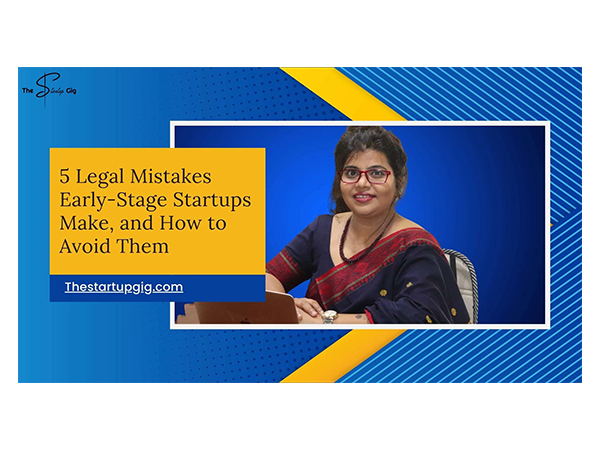5 Legal Mistakes Early-Stage Businesses Make, and How to Avoid Them
Jul 11, 2025

VMPL
New Delhi [India], July 11: Launching a Business is an exhilarating journey filled with bold ideas, ambitious plans, and long nights. But in the rush to build the next big thing, many founders overlook critical legal issues that can derail growth or sink the business entirely. Here are five of the most common legal mistakes early-stage businesses make, and practical advice on how to avoid them.
1. Not Formalizing the Founders' Agreement Early
The Mistake: Many businesses begin with verbal agreements or vague understandings between co-founders. When things go well, no one questions it. But when roles shift, equity disputes arise, or someone decides to leave, the lack of a clear, binding agreement can lead to messy, costly conflicts.
How to Avoid It: Draft a detailed Founders' Agreement at the outset. It should cover equity splits, roles and responsibilities, vesting schedules, decision-making processes, and what happens if a founder exits. It's not just about trust, it's about protecting relationships and the business.
2. Skipping IP Protection
The Mistake: Intellectual property (IP), your code, brand name, product design, or proprietary process, is often your most valuable asset. Ignoring IP protection, or assuming it's too early to matter, can lead to loss of rights or expensive disputes down the line.
How to Avoid It: Identify what IP your Business owns and take steps to protect it early. File trademarks, register copyrights, and if relevant, consider patent protection. Ensure that employees and contractors sign IP assignment agreements to avoid ownership confusion.
3. Using the Wrong Business Structure
The Mistake: Founders often register as a sole proprietorship or partnership without considering liability, tax implications, or investor expectations. The wrong structure can limit funding options or expose you to personal financial risk.
How to Avoid It: Choose a structure that supports your long-term goals. Private limited companies are often the preferred structure for businesses seeking investment. Consult a legal or tax advisor to understand what's best for your business type and growth plans.
4. Ignoring Employment Laws and Contracts
The Mistake: Hiring friends or freelancers without proper contracts might seem easier in the beginning, but it can create legal ambiguity around responsibilities, compensation, and termination.
How to Avoid It: Use clear employment or contractor agreements that define roles, deliverables, payment terms, and IP ownership. Stay informed about labor laws, especially regarding benefits, working hours, and termination processes, even for small teams.
5. Overlooking Regulatory Compliance
The Mistake: Many founders assume compliance is only necessary for large corporations. But even early-stage businesses must follow sector-specific laws, data protection rules, and tax regulations.
How to Avoid It: Identify the regulatory requirements in your industry (e.g., fintech, healthcare, e-commerce) and ensure your Business complies from day one. Non-compliance can lead to penalties or reputational damage that's hard to recover from.
Why It Works
It's founder-focused, practical, and informative, exactly what early-stage businesses need. It avoids legal jargon and instead uses simple, relatable language to explain serious legal pitfalls. Each section clearly identifies a mistake, explains the real-world consequences, and gives actionable advice to fix or prevent the issue. This approach builds trust with the reader by showing empathy for the Business journey while establishing authority in legal matters.
Closing Note: Every Business has a learning curve, but legal mistakes don't have to be part of it. By addressing these five issues early, founders can focus on scaling confidently, knowing they've laid a strong legal foundation, with The Business Gig as a trusted resource along the way.
(ADVERTORIAL DISCLAIMER: The above press release has been provided by VMPL. ANI will not be responsible in any way for the content of the same)









